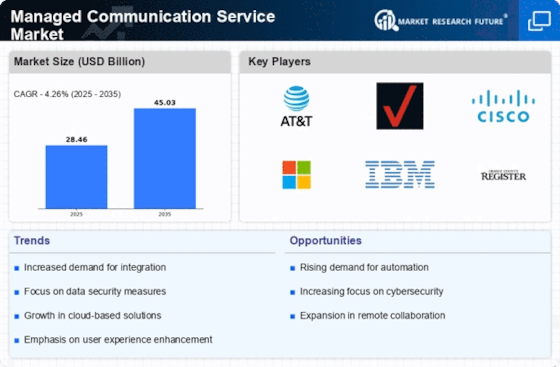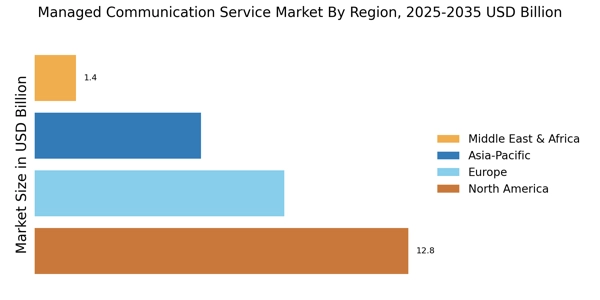Growing Importance of Data Security
The Managed Communication Service Market is increasingly influenced by the growing importance of data security. As organizations adopt digital communication tools, concerns regarding data breaches and privacy violations have escalated. Consequently, businesses are seeking managed communication services that prioritize security and compliance. Recent statistics indicate that nearly 70% of organizations consider data security a top priority when selecting communication solutions. This trend is likely to drive the demand for services that offer robust encryption, secure access controls, and compliance with industry regulations. By investing in secure managed communication services, organizations can mitigate risks associated with data loss and enhance their overall security posture, which is essential in maintaining customer trust and safeguarding sensitive information.
Increased Focus on Customer Experience
In the Managed Communication Service Market, there is an increasing emphasis on enhancing customer experience. Organizations are recognizing that effective communication is pivotal in building strong relationships with clients. As a result, many companies are investing in managed communication services that offer personalized and responsive customer interactions. Data suggests that businesses that prioritize customer experience can achieve up to 60% higher profitability compared to their competitors. This trend is likely to drive the adoption of managed communication solutions that enable businesses to engage with customers through multiple channels, including social media, email, and chat. By leveraging these services, organizations can ensure timely responses and foster customer loyalty, ultimately contributing to their long-term success.
Advancements in Technology and Integration
Technological advancements are playing a crucial role in shaping the Managed Communication Service Market. The integration of artificial intelligence, machine learning, and automation into communication services is transforming how organizations interact with clients and employees. These technologies enable businesses to streamline communication processes, enhance efficiency, and reduce operational costs. For instance, AI-driven chatbots are increasingly being utilized to handle customer inquiries, allowing human agents to focus on more complex issues. This shift is expected to contribute to a more efficient communication landscape, with the market projected to reach a valuation of over 50 billion dollars by 2026. As organizations continue to embrace these innovations, the demand for managed communication services that incorporate advanced technologies is likely to rise.
Rising Demand for Remote Communication Solutions
The Managed Communication Service Market is experiencing a notable increase in demand for remote communication solutions. As organizations continue to adapt to evolving work environments, the need for effective communication tools has surged. According to recent data, the market for managed communication services is projected to grow at a compound annual growth rate of approximately 12% over the next five years. This growth is driven by the necessity for seamless collaboration among remote teams, which has become a priority for businesses aiming to enhance productivity and maintain operational efficiency. Furthermore, the integration of advanced technologies such as video conferencing and instant messaging platforms is likely to further propel this demand, as organizations seek to provide their employees with robust communication tools that facilitate real-time interaction.
Shift Towards Cloud-Based Communication Solutions
The Managed Communication Service Market is witnessing a significant shift towards cloud-based communication solutions. Organizations are increasingly adopting cloud technologies to enhance flexibility, scalability, and cost-effectiveness in their communication strategies. Recent data indicates that the cloud communication market is expected to grow at a CAGR of around 15% over the next few years. This trend is driven by the need for businesses to adapt to changing market conditions and the desire to reduce infrastructure costs. Cloud-based solutions offer organizations the ability to access communication tools from anywhere, facilitating remote work and collaboration. As more companies recognize the benefits of cloud communication, the demand for managed services that provide these solutions is likely to expand, further shaping the landscape of the managed communication service market.

















